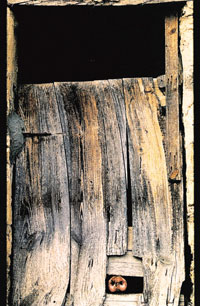I am writing this in the middle of an officially declared 'Estado de Alerta', a 'State of Alert' as the island again awaits the arrival of strong winds, heavy rain, and a dramatic lowering of temperatures. After the incredible damages of last weekend's storm (particularly on Mallorca and Minorca - it is estimated that 75,000 trees were destroyed and there was massive damage to particularly northern coastal areas - as I write this early on Thursday morning there are still 7000 people on Mallorca without electricity) the Balearic islands and Pitiusas (Ibiza and Formentera - we are actually a separate group of islands) are bracing themselves for the imminent arrival of another massive storm with potential winds estimates varying between 80-140 km/hour and rain estimates between 60-100 litres/metre3 over 12 hours. This is freak weather - it is the time of the 'temporal', as seasonal weather phenomenon, but this is worse than usual and is combined with the 'traumontana' winds bringing unseasonably cold weather from the north. So everyone is battening down the hatches and waiting to see what will happen. Consequently, this week's column will be very short: I need to finish it quickly and email it to our editor Gary Hardy before the winds knock out the electricity (as happened last weekend) or before the phone lines go down. As it looks like the storm may not leave our area until Friday things may be out for a while if the situation gets bad. Having lived (only just!) through some rough cyclones in Vanuatu in the Southwest Pacific (Cyclone 'Uma' in 1987 killed 50 people) I tend to be on the cautious side when rough weather is in the pipeline.
'Companatge'. I think this week I would like to briefly make a short note about a relatively new development in the Eivissa/Ibiza form of matançes (pig killings) and the production of sobrassades and botifarro: the forming of the local company 'Companatge' (readers of last week's column will remember that this is the term used for the 'full late breakfast' held at a rural peasant household for all those of the extended family and friends helping out in the matança). In the early 1990s the industrial butcher Juan Luis Ferra, a lover of Ibicencan sobressada and botifarro, decided to try and produce them on a larger scale following traditional Eivissenc methods and selling commercially to a wider audience. He realised that the best 'embutidos' were made from the almost disappeared porc negre (black pig) and decided to try and promote its re-introduction. By 1993 he had received a grant from the Ibiza Local Government's Agricultural Consul to assist in the project. Ferra became the Director of the project's company, which he called 'Companatge'. He wanted to produce traditional Ibicenco pig product 'embutidos', using modern methods following the traditional methods and making these products available to a public that would not necessarily normally have access to them. He wanted to produce them following recent EU (European Union) health and sanitary regulations so that these embutidos could also be officially exported. He set up cold storage rooms and modern machines to assist the work (this is on a small scale, not a massive one) and by mid-1993 had available to him the services of a professional traditional Ibicenco matançer (pig killer) and a matançera (a woman pig killer). At this time, he was putting the word out around the island that he wanted traditional black pigs, not the modern 'Large White' variety so common nowadays and the Ibiza Local Government Agricultural consul was to advise him on which pagesos eivissencos (rural Ibicenco peasants) he should try and contact. His plan was to raise black pigs himself, following new sanitary and veterinary regulations and then distribute the growing pigs to rural peasant households recommended to him by the local government - and giving regulation advice to these households. Once these pigs had been properly fattened, 'Companatge' would then buy them back and, with its pig killers and professional staff eventually produces the required 'embutidos'.
It was a good plan, and by 1996 the 'Companatge' company, then based in the village of Jesus, was in full production. It has now moved to the Carretera de San Miguel (at km 3.5) a wise move if one wants/needs to be nearer to rurally raised pigs. Their production is of high quality. As they say in their beautifully-produced 1996 publicity leaflet:
"Companatge le acerca a su mesa la autentica matanza casera ibicenca y le garantiza todas las caracteristicas de los autenticos productos artesanos de la isla de Ibiza. Recuerde, solo es autentica si lleva el sello de garantia."
("Companatge brings to your table (products of) the authentic Ibicencan matanza and guarantees all the characteristics of the authentic products of the island of Ibiza. Remember, it is only authentic if it bears the seal of guarantee."
And the seal shows.... An outline map of the island of Eivissa/Ibiza had overlain with a black pig.
Well, you cannot purchase Companatge's products in Privilege or Amnesia discotheques, but you can find them in quite a few island stores, including the Consumer/Syp chain of supermarkets. Give them a try!
All pictures © Gary Hardy (January 1991)
Kirk W Huffman
kirkwhuffman@ibizahistoryculture.com
Previous
Ric com un Verga Of Pigs and Men on Eivissa/Ibiza (7 of 10)
Continue Reading
Ric com un Verga Of Pigs and Men on Eivissa/Ibiza (Article 9 of 10)

